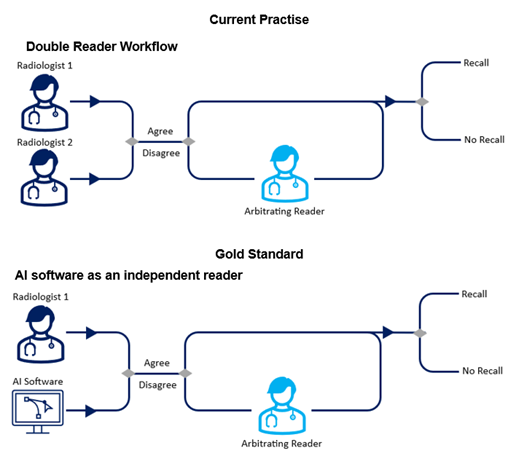Revolutionising breast screening with AI Integration
- Life Sciences & Healthcare, PMO & Project Delivery
The Healthcare industry in the UK is constantly evolving, with a keen focus on innovation to meet the ever-growing needs of patient care. In a collaborative effort with one of our clients, a pioneering medical technology firm with a workforce of approximately 50, MIGSO-PCUBED embarked on a journey to redefine routine breast cancer screening through the integration of state-of-the-art artificial intelligence software.
This dynamic partnership aimed to revolutionise the way breast cancer screening is conducted across various NHS trusts in England, with the ultimate goal of achieving more precise mammography results. Shortly after our client was awarded for the NHS evaluation for Artificial Intelligence (AI) in Healthcare Award, they witnessed the effectiveness of our project delivery services within an NHS trust where we were already engaged.
Table of Contents
The indispensable role of AI in breast cancer screening
Specialising in cutting-edge AI platforms tailored for radiologists, the software’s primary objective is to mitigate human error in the detection of breast cancer cells, thus enhancing the accuracy of patient recall decisions for further evaluation. Throughout this transformative journey, we played a pivotal role in navigating challenges such as stringent government-imposed deadlines, resource constraints within NHS breast screening units, and the imperative for a streamlined implementation process.
This case study serves as a testament to the indispensable role of AI in breast cancer screening ability while highlighting the complexities involved in adapting such advanced technology into healthcare infrastructures. It underscores the synergy between strategic project management and standardised processes in propelling breast cancer detection within the NHS to new heights.
The software itself represents a groundbreaking advancement in AI technology, empowering radiologists to make critical decisions with heightened confidence during breast screening procedures. By addressing the inherent challenge of human error, the software ensures that potential cases are not overlooked during routine scans. In the trial involving over 10,000 women, the AI software successfully detected 11 cancer cases initially missed by radiologists. Its capacity to deliver instant results has the potential to significantly reduce patient result waiting times from 14 days to 3 days—a monumental leap forward in patient care.
Medical innovation
In the current setup at the NHS, when a patient goes in for their regular breast screening, their scan undergoes review by two separate doctors. Based on their observations, a decision is made regarding whether the patient needs to be recalled if any signs of breast cancer are detected. Sometimes, a third doctor is brought in to make a final decision. However, there’s always a risk of human error, which could result in cases being overlooked, leaving patients untreated.
Our client proposes an industry changing solution; their AI software, in collaboration with just one doctor, could become the new gold standard. This software has the ability to detect cancer cells as small as 6mm, which is a size too small to be detected by the human eye. During the trial phase, this streamlined approach has shown up to a 45% boost in efficiency. Not only does this increase the chances of patient survival, but it also alleviates pressure on the NHS.

Maneuvering through healthcare industry challenges
Our client was up against a pressing industry challenge; by 2027, it’s expected that there will be a 41% shortfall in radiologists in England. To tackle this, they turned to AI software in healthcare environments. While it won’t replace doctors, it’s a valuable tool that assists them, freeing up more face-to-face time for patient care.
Adding to the complexity, our client faced strict timelines imposed by the government AI service evaluation award. They had just 12 months to complete all clinical trials after receiving the award, with funding specifically designated for enhancing the deep learning capabilities of their AI software. The success of this endeavour relied on rolling out the software across various NHS breast screening units to gather crucial evidence and assess its benefits.
However, implementing the software posed challenges. The NHS units were already operating at full capacity, lacking the resources needed for a smooth integration. Faced with these hurdles, our client sought the expertise of MP for professional project management services. Their journey highlights common obstacles in the medical technology industry, including tight deadlines, resource constraints, and the need for streamlined implementation processes when integrating advanced AI solutions into healthcare settings.
Crafting a path to seamless integration
MP played a pivotal role in overcoming the challenges stated above by establishing standardised project implementation documentation that was used across 7 different NHS sites in England. This involved creating uniform project plans on a platform such as Microsoft Excel to ensure the client was comfortable and familiar with the software being used, defining roles and responsibilities for the steering group and stakeholders through bi-weekly steering committee sessions, implementing a governance structure, and utilising templates such as RAID (Risks, Assumptions, Issues, and Dependencies) log. These tools were critical in streamlining the implementation process, ensuring consistency across different NHS trusts, and accelerating the software deployment timeline.
MP took charge of project management activities and governance for specific NHS trusts. MP meticulously planned and executed processes, secured necessary approvals, managed stakeholder communications, and ensured adequate resourcing for a successful software launch. To address the challenge of tight resources in the NHS, MP collaborated closely with each trust, optimising resource allocation and prioritising tasks to maximise efficiency. This involved identifying areas where additional support was needed and coordinating with NHS staff to fill any resource gaps.
In addition to project management techniques, MP employed agile methodologies to adapt quickly to changing circumstances and stakeholder needs. Regular meetings and status updates were held to keep all parties informed and address any emerging issues promptly. Continuous monitoring of project progress and proactive risk management were also key components of MP’s approach, ensuring that any obstacles were identified early and mitigated effectively.
MP’s comprehensive project management strategies, combined with agile methodologies and collaborative teamwork, enabled the successful implementation of the AI software across multiple NHS trusts despite resource constraints and tight timelines.
Reaping the rewards in healthcare transformation
- Standardisation of deployment tools: The implementation tools, including project plans and project control documentation, were standardised. This not only ensured consistency but also facilitated a smoother and more efficient implementation process.
- Improved implementation time: The streamlined processes meant that our client was able to focus on enhancing the technical aspects of the software, while MP ensured timely implementation of the AI software. This coordination facilitated a smooth transition from development to the connection phase.
- Enhanced site and clinical engagement: MP’s efforts resulted in improved engagement with NHS screening sites. This, in turn, fostered higher levels of clinical engagement during case reviews, contributing to the overall success of the project.
- Transparency through information and reporting: The introduction of improved information and reporting processes increased transparency at all levels. Stakeholders had clearer insights into the project’s progress, contributing to better decision-making and project governance.
Pioneering progress: chartering the course for future healthcare evolution
The collaborative efforts with our client, have helped to revolutionise routine breast cancer screening through the integration of cutting-edge artificial intelligence software. This partnership aimed to deploy innovative software across multiple NHS trusts in England, with the objective of achieving more accurate mammography results.
Through our services of project management and strategic planning, MP navigated through challenges such as tight deadlines, resource constraints, and the need for efficient implementation processes. By establishing standardised project implementation documentation and utilising agile methodologies, consistency was ensured for our client.
The successful implementation of the AI software across multiple NHS trusts demonstrates the tangible benefits of strategic project management and collaborative teamwork. Not only has this initiative improved the accuracy of breast cancer screening, but it has also alleviated pressure on healthcare resources and provided patients with faster and more reliable results.
Moving forward, the lessons learned from this collaboration will aid in shaping future projects in the medical technology industry. By continuing to leverage strategic project management techniques, MP remains committed to driving innovation and improving healthcare outcomes for patients worldwide
This article was written by Damini Jain, Senior Consultant
Loved what you just read?
Let's stay in touch.
No spam, only great things to read in our newsletter.



